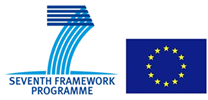

HEALTHY FUTURES - Health, environmental change and adaptive capacity: mapping, examining and anticipating future risks of water-related vector-borne diseases in eastern
Africa
|
|
|
Coordinator: Trinity College, University of Dublin (TCD), Ireland
Start: 1st June 2010
Duration: 48 months
Funding Programme: 7th Framework Programme (FP7)
Sub-Programme: Co-Operation: Theme 2 Food, Agriculture & Fisheries, and Biotechnology
Funding Scheme: Coordination and Support actions (coordinating)
For more information on this project:
Visit: www.healthyfutures.euOr contact: Paul Lowen, Email: paul@aquatt.ie, Tel: +353 1 644 9008
Background:
Environmental change, such as climate change, will affect and impact human health, which is a major concern for the global community. The effects will however be felt most acutely among the poorest members of society. Much concern has focused on the future distribution and spread of infectious diseases, and in particular the negative health impacts of changes in transmission and outbreaks of vector-borne diseases (or VBDs) as a result of climate change. The impacts may be direct, in terms of outbreaks of disease among human populations, or indirect, in the form of outbreaks of diseases that affect domesticated animals or plants, and therefore jeopardise food security, agriculture-based economic activities and trade.The HEALTHY FUTURES project is motivated by concern for the health impacts of environmental changes. It aims to respond to this concern through construction of a disease risk mapping system for three water-related, high-impact VBDs (malaria, Rift Valley fever and schistosomiasis) in eastern Africa, taking into account environmental/climatic trends and changes in socio-economic conditions to predict future risk.
Objectives:
The project focuses on three water-related, high-impact VBDs in eastern Africa (comprising the countries of Burundi, Kenya, Rwanda, Uganda and United Republic of Tanzania). It will take into account environmental/climatic trends and changes in socio-economic conditions to predict future risk. HEALTHY FUTURES aims to; - Build partnerships between African and European researchers and organisations in the fields of environmental change, and animal and public health;
- Gain a comprehensive overview and knowledge of the historical, socio-economic and environmental factors of the 3 target VBDís;
- Devise and construct a future disease and risk vulnerability mapping system, and accompanying Decision Support tools to anticipate and respond to early warnings of future outbreaks, and;
- Connect and transfer knowledge to key stakeholders, and the wider scientific and policy-related communities.
Deliverables/Expected Outcomes:
- An evaluation of and development of statistical & dynamical disease models.
- High resolution regional climate projections for the eastern African study region and future disease risk and vulnerability maps.
- An online information board, workshops and international conferences.
- Peer-reviewed publications in high impact journals.
- Two-way dialogue between researchers and key stakeholders within the consortium.
Partners:
- Trinity College, University of Dublin, Dublin, Ireland
- Earth Systems Physics, The Abdus Salam International Centre for Theoretical Physics, Italy
- Paris-Lodron Universität Salzburg, Austria
- Sveriges Meteorologiska och Hydrologiska Institut, Norrköping, Sweden
- University of Nairobi, Nairobi, Kenya
- AquaTT, Dublin, Ireland
- International Livestock Research Institute, Nairobi, Kenya
- National University of Rwanda, Rwanda
- Stockholm Environment Institute, Tanzania
- Vector Control Division, Ministry of Health, Uganda
- Kenya Medical Research Institute, Kenya
- Malaria and Other Parasitic Diseases Division (MOPDD), Institute for HIV/AIDs Disease Prevention and Control, Rwanda
- University of Cape Town, South Africa
- University of Durham, UK
- University of Liverpool, UK



